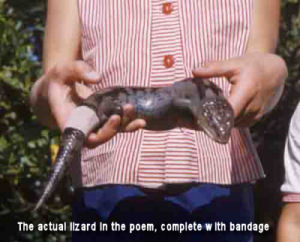Project wild thing
 British film maker David Bond interviewed today on ABC radio was saying that childhood obesity and too much screen time were linked. The amount of screen time robs children of time spent outdoors, having adventures, being in their own world, being independent from their parents and developing an appreciation of nature.
British film maker David Bond interviewed today on ABC radio was saying that childhood obesity and too much screen time were linked. The amount of screen time robs children of time spent outdoors, having adventures, being in their own world, being independent from their parents and developing an appreciation of nature.
He said that there are increasing barriers to children playing outdoors now, for instance increased traffic. He said that we (in Britain) provide wildlife corridors for animals (although in Australia there are hardly any) but we do not provide corridors for children. He cited a place, where in desperation it was proposed to put a children’s playground underground!
 He said the makers of computer games were very adept at getting children’s attention and getting them to be absorbed in the games. He said that he did not want to sound too cynical but that this is a great opportunity to advertise to the children.
He said the makers of computer games were very adept at getting children’s attention and getting them to be absorbed in the games. He said that he did not want to sound too cynical but that this is a great opportunity to advertise to the children.
He said there was a lot more parental protectiveness and fear than in previous generations e.g. “stranger danger” yet, he said that in fact there was no actual increase in dangers to children. He said children should want to meet strangers as most of them are OK people and not be afraid of them. ( I disagree with him on this in that I think that children should have a healthy mistrust of people they don’t know especially those who approach them.)
It seems that there are so many things that conspire against children having unstructured time out- doors. The dual income working family (of economic necessity, usually) also mitigates against children having time to wander in their environment in an unstructured way. This could be because they have to be enrolled in after school activities whereas 30-40 years ago, they would have played in the back yard or the street where one parent , probably the mother would have been “on duty “ either at home or at the home of a neighbour.
David Bond is based in the UK but a lot of what he was talking about is relevant to Australia.
A really serious consequence that I see of children growing up not appreciating nature (and he said they need to have exposure before the age of about 10 to develop this affinity) is that what is left of the environment in the -15 years’ time when they grow up with not be valued by these young adults as it was never experienced. The environment will just be theoretical or abstract.
What Mr. Bond did not say during this interview was that rising population was contributing to this situation. But what is behind increased traffic? Mr. Bond has highlighted something important, which is that children are sitting around gazing at screens for hours on end being sold to by large companies. They are having their brains moulded to that experience , they are physically inactive while this is happening. They are missing out on experiences that are not mediated by other people. i.e. direct experiences of their environment and nature. One can easily see the process as the children become faithful disciples of consumerism. Mr. Bond pointed out that their life expectancies as a result of inactive childhood will shorten their life spans but presumably not to the extent that they will not be able to raise the next generation of consumers. Big Business wins regardless of the fact that their little consumers don’t live out their full 83 years, as these children and their children , deprived of their birthright, the environment (as are wild animals in a zoo), will still produce a never- ending supply of consumers.
Mr Bond wants to re-introduce children to the outdoors and to this end has conceived of a widely targeted campaign. If he can succeed, he may break part of the cycle that keeps the capitalist machinery going. With natural areas disappearing in Australia at an alarming rate, due to rapid population growth and development it is not that easy for children to find space to explore. The more difficult campaign is to slow the population growth that is removing nature and open space from around the places where we live.

 I used to see all kinds of frogs in our garden as a child,
I used to see all kinds of frogs in our garden as a child,
Recent comments